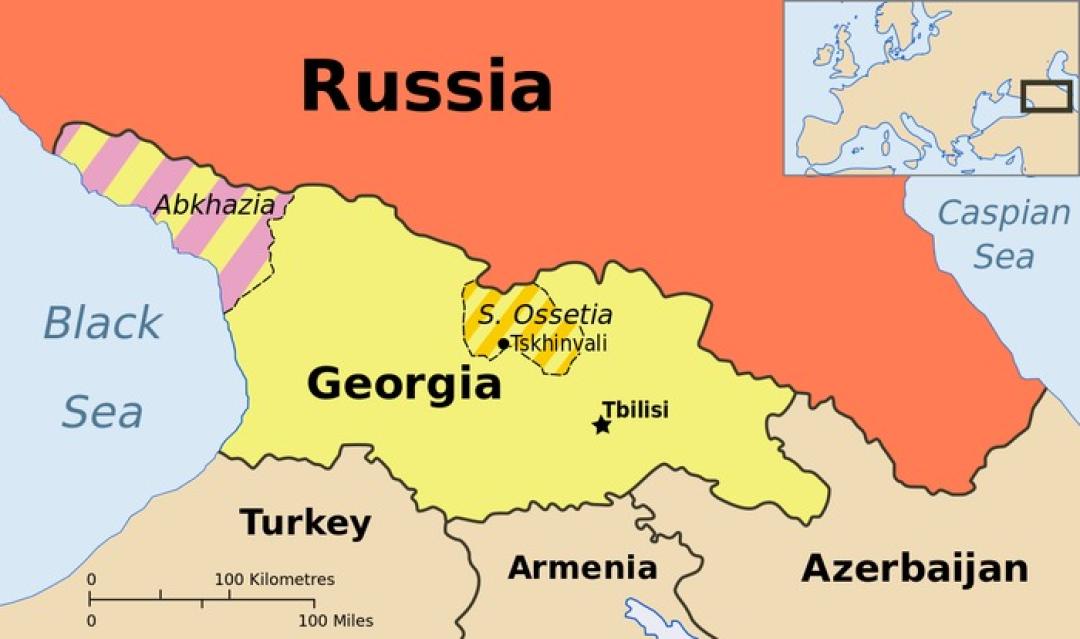
De-facto presidential election in separatist South Ossetia and international reactions

The de-facto President and presidential candidate of the Georgian separatist region of Tskhinvali (South Ossetia) Anatoly Bibilov announced that a second round of presidential elections would take place. “We understand that there will be a second round,” he said on the evening of April 10 after processing 96% of the ballots.
South Ossetian presidential candidates Alexander Pliev, Gary Muldarov and Dmitry Tasoev will support Alan Gagloev in the second round of elections, if needed, rather than the incumbent.
According to the headquarters of four opposition candidates, after processing 80% of the protocols, Gagloev is in the lead in the elections.
Candidate for the presidency of South Ossetia Alan Gagloev is gaining the majority of votes in the presidential elections in South Ossetia. He announced this on the square in the centre of Tskhinvali, where the inhabitants of South Ossetia gathered in anticipation of the election results. So far, no one has named specific figures, but according to the data transmitted by local telegram channels from individual polling stations, Gagloev is gaining the majority of votes. Close to him is incumbent President Bibilov, and in third place is Alexander Pliev.
Polling stations for the presidential elections in South Ossetia closed at 20.00. The representative of the Central Election Commission of South Ossetia, Igor Chochiev, announced the data on the final turnout of voters in the presidential elections in the republic.
65 unofficial people were watching the elections, including from Russia, Syria, Austria, Turkey, and other countries. Nobody reported violations. To win, a candidate must overcome the 50% hurdle.
On 10 April, elections of the President of the Republic were held in separatist South Ossetia. The current de-facto president Anatoly Bibilov, vice-speaker of the parliament Alexander Pliev, leader of the Nykhas political party Alan Gagloev, deputy of the parliament Garry Muldarov, and former deputy of parliament Dmitry Tasoev were fighting for the highest state post.
76 polling stations were formed for elections, including four outside the de-facto republic - two in North Ossetia (about 5,000 voters of South Ossetia can vote at polling stations in Vladikavkaz) and one each in Moscow and Sukhumi.
Georgia’s and international reaction about de-facto elections
Georgia condemned the "so-called" presidential election in its breakaway region of South Ossetia. In a statement, the Georgian Foreign Ministry described vote as “an another illegal act of Russia directed against Georgia’s sovereignty and territorial integrity,” saying it violates international norms and principles.
“Such provocative actions are aimed to legitimise the illegal occupation of Georgia's two regions (Abkhazia and South Ossetia) and the ethnic cleansing of Georgians,” the readout said.
“The so-called referendum on unification with Russia recently announced by the Tskhinvali occupation regime will likewise be null and void as another illegal step taken towards annexation,” it flagged.
The Foreign Ministry of Georgia also called on Russia to respect the sovereignty and territorial integrity of Georgia, comply with its international obligations, and revoke its illegal decision on recognition of so-called independence of the occupied regions.
The Ministry of Foreign Affairs of the Republic of Azerbaijan reaffirmed its support for Georgia's sovereignty and territorial integrity and does not recognise the so-called "presidential elections" held on April 10, 2022, in the Tskhinvali region of Georgia, as well as their results. The Azerbaijani Foreign Ministry considers it important to continue negotiations for a peaceful settlement of the Tskhinvali issue in accordance with the norms and principles of international law.
According to U.S. Embassy in Georgia, the United States does not recognise the legitimacy of the so-called presidential elections held in Georgia’s South Ossetia region on April 10 and will not acknowledge their outcome. “Our position on Abkhazia and South Ossetia remains clear: these regions are integral parts of Georgia. No ‘elections’ or a priori illegitimate ‘referendum’ calling for incorporation of South Ossetia into Russia can change this. Accordingly, we reiterate our strong support for Georgia’s sovereignty and territorial integrity within its internationally recognized borders,” U.S. Embassy stated.
In his remarks, the European Union Ambassador to Georgia, Carl Hartzell stated on April 10 that the EU does not recognise the constitutional and legal framework in which “the so-called presidential elections are taking place in the Georgian breakaway region of South Ossetia.”
“We continue to support Georgia’s sovereignty and territorial integrity within its internationally recognised borders and to pursue our policy of non-recognition and engagement, including through the EU Special Representative and the EU Monitoring Mission,” noted the EU Ambassador.
There is not any statement from Armenia about de-facto presidential election in separatist South Ossetia yet.
See Also


Simonyan: “Armenia Should Trade with Turkey and Azerbaijan Instead of Closing Borders”

Mirzoyan Meets US Deputy Assistant Secretary Joshua Huck

Azerbaijani President Holds Talks with UAE and German Business Delegations on Economic Cooperation

Grigoryan Confirms Armenia’s Readiness to Dissolve OSCE Minsk Group Upon Peace Treaty Signing

